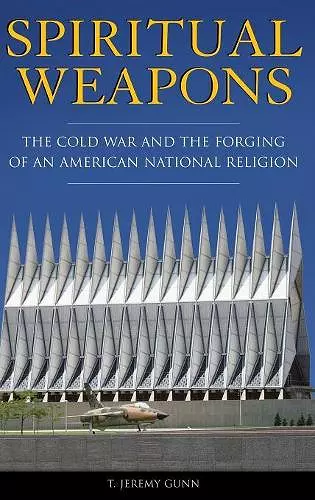Spiritual Weapons
The Cold War and the Forging of an American National Religion
Format:Hardback
Publisher:Bloomsbury Publishing PLC
Published:30th Dec '08
Currently unavailable, and unfortunately no date known when it will be back

"Jeremy Gunn is a superb cultural therapist. Spiritual Weapons lays out compellingly the historical roots of a distinctive American characteristic, on special display over the past sixty years, to sanctify uncritically its military and economic activity around the world. The first step to counteracting the ill-effects of American National Religion is to read this book." -- Professor David Little, T.J. Dermot Dunphy Professor of the Practice in Religion, Ethnicity, and International Conflict, Harvard Divinity School "This is a chillingly incisive analysis of the rise of American religious nationalism during the Cold War and the establishment of a new trinity of theism, militarism, and capitalism that has shaped American policy for sixty years. Written by one of the nation's leading advocates of religious liberty, this book will enlighten and frighten readers to think anew about the wisdom of separating church and state." -- John Witte, Jr., Emory University "While it has long been understood that American foreign policy changed significantly after 1947, what is much less known is how post-war American foreign policy changed who we are. Gunn's Spiritual Weapons offers surprising and unsettling insights not only into how we created much of our Cold War worldview, but how that worldview continues to shape our thinking in ways we have not fully grasped. If you want to understand the relationship between religion and politics in America today, you must read this book." -- Robert Seiple, President/CEO Council for America's First Freedom, Richmond, Va. "Jeremy Gunn's fascinating book is the first to argue convincingly that the nation's civil religion actually did not crystallize until the post-WW II era. All who are intrigued by the merger of religion and national affairs are sure to find Gunn's Spiritual Weapons a treasure chest of illuminating history and captivating ideas that help us to understand and characterize the nation that the United States of America has become." -- Derek H. Davis, J.D., Ph.D., Director, Center for Religious Liberty, University of Mary Hardin-Baylor, TX
While some may argue that religion has & continues to influence U.S. foreign policy, others would argue that foreign policy has significantly influenced an American National Religion after 1947. Here, Gunn shows that in the wake of World War II, Americans quickly returned to their traditional peacetime suspicion of the military & engaged in disputes over capitalism. When Churchill delivered his Iron Curtain speech in 1946, the American press & American politicians panned it. Only one year later, the United States began to identify itself in reaction to the Soviet Union & its growing power and influence on the world stage. If the USSR promoted governmental affirmations of atheism, so the United States would respond with its public declarations of God. This was the origin of under God in the Pledge of Allegiance (1954), In God We Trust on paper money (1955), and other public declarations about God and religion. Tracing the development of this influence on American religion, Gunn reveals a new way of looking at how public faith has been transformed by world events and the U.S.'s reaction to them.
Covering topics such as American national religion, government sponsorship of God and prayer, military activities, the Vietnam war, and current views on religion and foreign policy, the author underscores the ongoing influence foreign affairs and foreign policy have on religion and how it is practiced, both privately and publicly, in the United States. The post-WWII backlash to events occurring around the world, he contends, continues to shape and inform our notions of God and country, public faith, and the U.S.'s position in the global village. Taking the reader through this history to the present day, the author sheds new light on this important topic.
"Gunn (religion and human rights, Emory U.) directs the program of freedom of religion and belief at the American Civil Liberties Union argues that after 1947, a new worldview emerged among Americans that was forged by the Cold War and rose in reaction to both the perceived and real dangers posed by the Soviet Union and communism. The pillars of this view were governmental theism, military supremacy, and capitalism as freedom." - Reference & Research Book News
"This thoughtful exploration of religion's changing role in American foreign policy from the Cold War to Vietnam offers important discussions of that history's contemporary impact. Summing Up: Recommended. Upper-level undergraduates through faculty/researchers; general readers." - Choice
ISBN: 9780275985493
Dimensions: unknown
Weight: unknown
312 pages